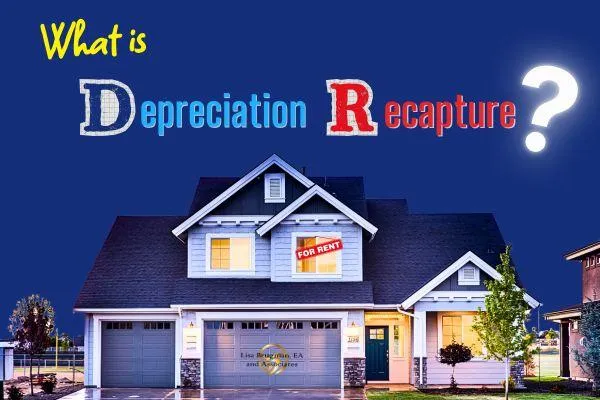BLOG

What is Depreciation Recapture?
Introduction to Depreciation Recapture and Section 121 Exclusion
The U.S. tax code offers various ways for homeowners to minimize taxes on the sale of their property, particularly if the property has been used as a primary residence. One powerful tool for this is the Section 121 Exclusion, which can help homeowners exclude up to $250,000 (or $500,000 for married couples) of capital gains from the sale of their primary residence. However, when a homeowner has rented out part of their residence, such as a room, they may need to consider depreciation recapture—a specific tax on the depreciation deductions taken for the rented portion of the home. This blog explores how depreciation recapture works and its impact on the Section 121 exclusion when a portion of the home has been rented.
Understanding Depreciation and Depreciation Recapture
What is Depreciation?
Depreciation is an accounting method that allows property owners to deduct a portion of the property’s cost each year as it "wears out" or loses value due to use. For rental properties, depreciation is typically applied over 27.5 years for residential real estate, and it can significantly reduce taxable rental income by allowing the homeowner to deduct these expenses annually.
Depreciation Recapture
When a property that has been depreciated is sold, the IRS requires the owner to "recapture" that depreciation as taxable income. This means the owner must pay taxes on the amount of depreciation claimed during the rental period. Depreciation recapture is taxed at a flat 25% rate, regardless of the taxpayer’s income bracket, and it applies only to the portion of the home that was used for rental purposes[1].
The Section 121 Exclusion
Section 121 of the IRS tax code allows homeowners to exclude a substantial portion of their capital gains on the sale of their primary residence. To qualify for this exclusion, homeowners must meet the following criteria:
Ownership Requirement: The homeowner must have owned the home for at least two years.
Use Requirement: The homeowner must have lived in the home as their primary residence for at least two of the last five years.
Gain Exclusion Limits: Up to $250,000 of gain can be excluded for single filers, or up to $500,000 for married couples filing jointly.
This exclusion can help homeowners avoid paying capital gains tax on the majority of the profit from their home sale if they meet these requirements[2].
How Depreciation Recapture Affects the Section 121 Exclusion
When a homeowner rents out a room in their primary residence, the portion of the home used for rental becomes subject to depreciation, which can impact their tax situation when they sell the property. Here’s how depreciation recapture can affect the Section 121 exclusion:
Limitations on Exclusion for Rental Portions: The Section 121 exclusion applies only to the gain on the primary residence portion of the home. The gain attributable to the rented portion of the home does not qualify for the Section 121 exclusion. This means if a homeowner sells their property, they must calculate the gain for the rented portion separately and apply depreciation recapture to that gain.
Depreciation Recapture Requirement: Depreciation deductions taken for the rented portion must be recaptured, even if the overall sale qualifies for the Section 121 exclusion. For example, if a homeowner rented out a room and claimed $5,000 in depreciation over the rental period, they would owe taxes on that $5,000 under the 25% recapture tax rate, regardless of the capital gains exclusion[3].
Allocation of Gain and Depreciation: When calculating the capital gain for the sale, the gain must be allocated between the rental portion and the personal residence portion. This allocation is typically based on the square footage used for rental purposes versus the total square footage of the home. Only the gain attributed to the owner-occupied portion can benefit from the Section 121 exclusion, while the gain from the rental portion will be subject to recapture and potentially additional capital gains tax[4].
Tax Impact: The depreciation recapture can lead to a significant tax liability, especially if a large portion of the home was rented, or if it was rented for an extended period. The flat 25% tax rate on recaptured depreciation can increase the effective tax burden on the sale, reducing the net proceeds even if the homeowner qualifies for the Section 121 exclusion on the owner-occupied portion[5].
Example Calculation
Let’s consider an example:
Initial Purchase Price of Home: $400,000
Portion Rented Out: 20% of the home
Total Depreciation Claimed on Rental Portion: $10,000 over the rental period
Sale Price of Home: $600,000
Capital Gain: $200,000 ($600,000 - $400,000)
Calculate the Gain on the Rental Portion: Since 20% of the home was rented out, the capital gain attributed to the rental portion is 20% of $200,000, or $40,000.
Depreciation Recapture Tax: The homeowner must pay 25% of the $10,000 depreciation claimed, resulting in a $2,500 tax.
Section 121 Exclusion: The remaining $160,000 gain (from the 80% owner-occupied portion) can be excluded from tax under the Section 121 exclusion.
Key Considerations for Homeowners
Homeowners renting out a portion of their primary residence should consider the following to minimize tax liabilities related to depreciation recapture:
Limit Rental Use Before Sale: Reducing or eliminating rental use in the years before selling can decrease depreciation recapture liability, as depreciation claims will end once the rental activity stops.
Plan for Recapture: Since depreciation recapture is inevitable for the rental portion, homeowners should budget for this tax expense in their sale plans.
Consult a Tax Professional: Tax laws regarding depreciation recapture and Section 121 can be complex. Professional advice can help homeowners properly allocate gain, manage deductions, and maximize exclusions.
Conclusion
The Section 121 exclusion provides homeowners with a substantial tax benefit on the sale of their primary residence, but when part of the home is rented out, the impact of depreciation recapture must be considered. Homeowners can benefit from understanding how to allocate gain, the tax implications of recapture, and strategies to minimize taxable income. Proper planning and professional guidance are essential to navigating the tax implications effectively and ensuring a favorable financial outcome when selling a home that has been partially rented.
If you are still unsure about your situation and want help, you can click this link to set an appointment to speak with an expert at Lisa Brugman, EA & Associates.
https://storage.googleapis.com/msgsndr/Y3wru9o2agtnTx66z5uZ/media/650d578315fdd01eb024474b.png
https://storage.googleapis.com/msgsndr/Y3wru9o2agtnTx66z5uZ/media/650d578215fdd056b424474a.jpeg






